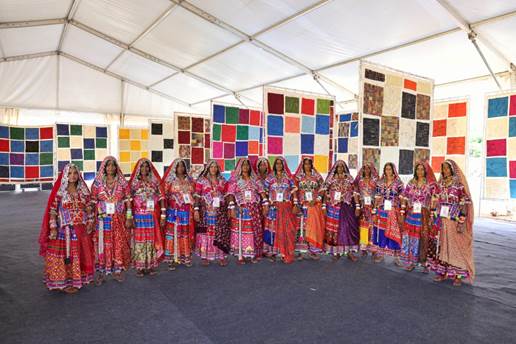
As part of the 3rd Culture Working Group Meeting of G20 in Hampi, under its ‘Culture Unites All’ campaign, the Culture Working Group, Ministry of Culture has set a Guinness World Record for the ‘Largest Display of Lambani Items’.
The unique exhibition on Lambani embroidery patches was inaugurated at the Yeduru Basavanna complex, Hampi by Minister of Parliamentary Affairs & Coal and Mines, Shri Prahlad Joshi today.
The theme for the exhibit is ‘Culture Unites All’. This display is titled ‘Threads of Unity’ and celebrates the aesthetic expressions and design vocabulary of Lambani embroidery.
Over 450 Lambani women artisans and cultural practitioners associated with Sandur Kushala Kala Kendra Kendra (SKKK) came together to create these items using GI-tagged Sandur Lambani embroidery having 1755 patchworks. This Guinness World Record endeavour is aligned with the PM’s campaign of Mission ‘LiFe’ (Lifestyle for environment) and the CWG’s initiative for ‘Culture for LiFe’, an environmentally conscious lifestyle and a concerted action towards sustainability.
Speaking on the occasion Shri Prahlad Joshi said that the Lambani patchwork embroidery exemplifies many traditional sustainable practices of India and this sustainable practice aligns with the Prime Minister’s campaign, Mission ‘LiFe’ (Lifestyle for environment), and the Culture Working Group’s initiative for ‘Culture for Life,’ which promotes an environmentally conscious lifestyle and concerted action towards sustainability.
He also said that the project of the Lambani Guinness World Record is a product of the CWG campaign ‘Culture Unites All’, which celebrates the varied and dynamic cultural expressions of humankind.He added that as in a patchwork, where different pieces come together to form a larger textile, ‘Culture Unites All’ advocates that cultures of the world are distinct yet connected.
Lambani embroidery is a vibrant and intricate form of textile embellishment characterized by colourful threads, mirror work, and a rich array of stitch patterns. It is practised in several villages of Karnataka such as Sandur, Keri Tanda, Mariyammanahalli, Kadirampur, Sitaram Tanda, Bijapur, and Kamalapur. This rich embroidery tradition, predominantly upheld by the skilled women of the Lambani community, serves as a vital source of livelihood and sustenance, intertwining living practices with economic empowerment.
The promotion of this craft will not only preserve a living heritage practice of India but will also support the economic independence of women. This initiative is congruent with the third priority of the CWG, ‘Promotion of Cultural and Creative Industries and Creative Economy’, as it spotlights the rich artistic tradition of Lambani embroidery, thereby promoting the creative economy of Karnataka and India.
The sustainable practice of patchworking is found in many textile traditions of India and around the world. Lambani craft tradition involves skilfully stitching together small pieces of discarded fabric to create a beautiful fabric.
The embroidery traditions of the Lambanis are shared in terms of technique and aesthetics with textile traditions across Eastern Europe, West, and Central Asia. This alludes to the movement of the nomadic communities across such regions historically, forming a shared artistic culture. This interconnectedness of cultures through the craft makes it an ideal symbol for the campaign ‘Culture Unites All’. Through this art form, we celebrate our shared heritage and promote dialogue and understanding among diverse communities.
By celebrating our shared heritage and promoting sustainable practices, this display serves as a testament to the power of unity, diversity, interconnectedness, and harmonious coexistence among cultures, encapsulating the essence of ‘Vasudhaiva Kutumbakam’.
About Sandur Kushal Kala Kendra (SKKK)
Sandur Kushal Kala Kendra (SKKK), registered as a Society in 1988, aims to revive traditional crafts and enhance the livelihoods of craftswomen by nurturing their skills, promoting their products, and thus ensuring a steady income. Presently, SKKK works with approximately 600 artisans and has nurtured twenty self-help groups. It has evolved over the years and gained recognition for the Lambani craft, both nationally and internationally.
Over the years, SKKK has gained national and international recognition for the Lambani craft, earning the prestigious UNESCO Seal of Excellence for Handicrafts in South Asia in 2004 and 2012. SKKK obtained the GI (Geographical Indication) tag for the craft ‘Sandur Lambani hand embroidery’ in the year 2008.


